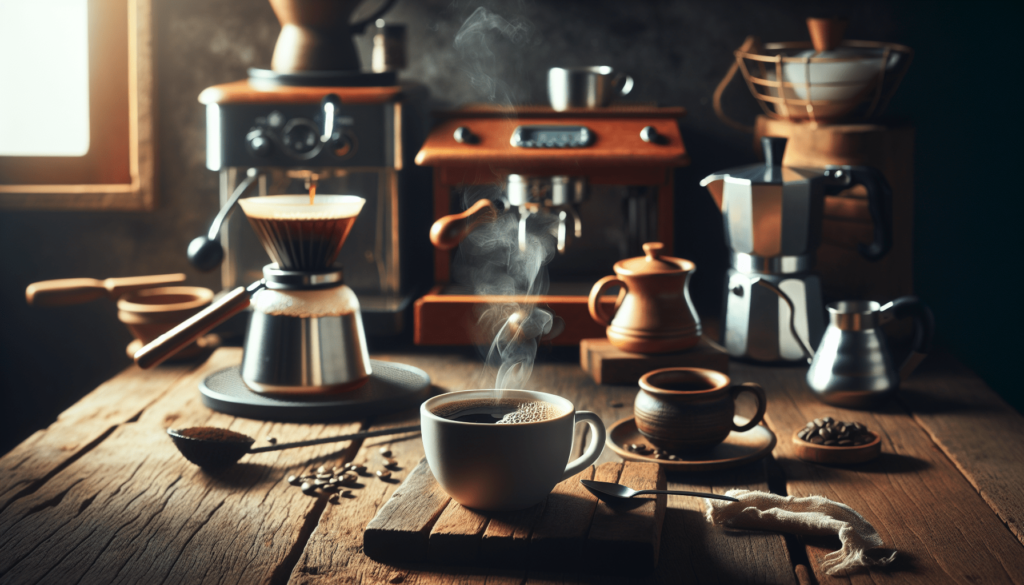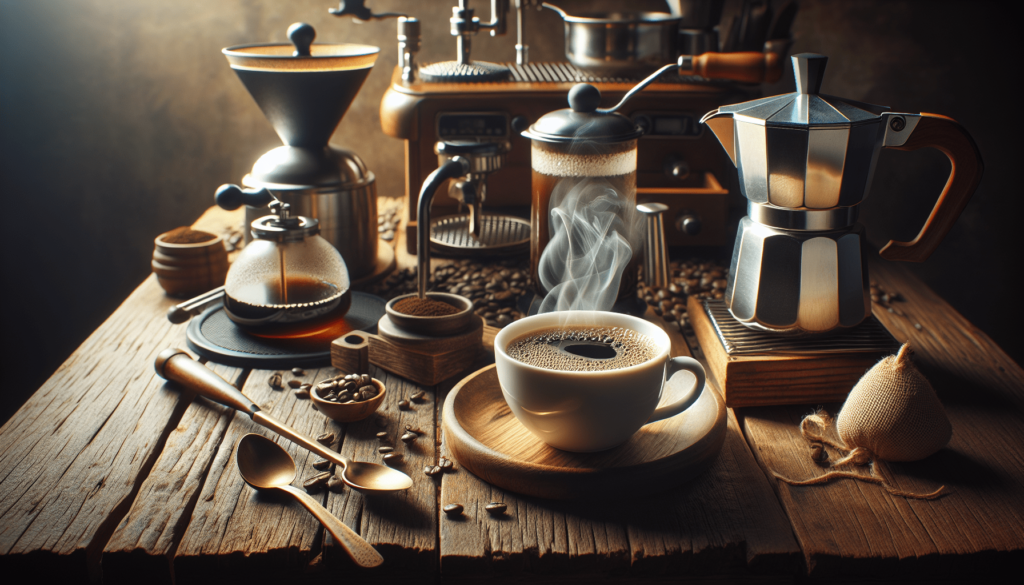How long does coffee brewing take? If you’re a coffee lover, you probably know that the brewing time plays a crucial role in determining the taste, strength, and overall quality of your cup. Understanding the nuances of different brewing methods can make a world of difference, transforming your morning routine into a delightful experience. This ultimate guide will walk you through various coffee brewing methods, how long each takes, and why each method might be the perfect fit for your lifestyle and taste preferences.
Understanding the Basics of Coffee Brewing
Before diving into the specific methods and their brewing times, it’s essential to understand the core factors that affect coffee brewing. These include the grind size, water temperature, and brewing method. Each of these elements interacts uniquely depending on the technique you use, ultimately influencing how long the brewing process takes.
Grind Size
The size of the coffee grounds profoundly impacts the brewing time. Finer grinds extract flavors quicker, while coarser grinds require a longer brewing time. Finding the right balance is crucial for achieving the desired taste.
Water Temperature
The temperature of the water significantly affects how quickly the coffee grounds release their flavors. Generally, water that’s too hot can over-extract the coffee, leading to a bitter taste, while too-cool water might under-extract, resulting in a weak brew. The optimal range is usually between 195°F and 205°F (90°C to 96°C).
Brewing Technique
Different brewing methods involve varying amounts of coffee grounds, water, and specific equipment, all of which contribute to the total brewing time. Understanding the nuances of each method helps in picking the right one for your needs.
Brewing Methods and Their Timelines
Now that we’ve covered the basics, let’s dive into specific brewing methods. We’ll discuss the time each method takes and what makes each unique.
Drip Coffee
Drip coffee is one of the most common and convenient methods for daily use. It’s often the go-to choice for many households and office setups, thanks to its simplicity and ability to produce consistent results.
Brewing Time
Drip coffee generally takes between 4 to 6 minutes to brew.
| Step | Time |
|---|---|
| Heating Water | 1-2 minutes |
| Brewing | 3-4 minutes (varies) |
This method relies on an automatic coffee maker that heats water and drips it over coffee grounds in a filter. The brewed coffee then drips into a carafe, ready to serve.
French Press
The French Press, also known as a press pot or plunger pot, is popular for those who appreciate a richer and more full-bodied coffee. It has a straightforward brewing process but requires careful timing.
Brewing Time
The French Press usually takes around 4 minutes to brew.
| Step | Time |
|---|---|
| Adding grounds | 0.5 minute |
| Steeping | 4 minutes |
| Plunging | 0.5 minute |
The process involves adding coarsely ground coffee to the French Press, pouring hot water over it, and letting it steep. Afterward, you press the plunger down to separate the grounds from the brew.
AeroPress
The AeroPress is a favorite among coffee enthusiasts looking for a quick yet rich and smooth cup of coffee. This method is highly versatile, allowing you to experiment with different grind sizes and brew times to achieve your preferred taste.
Brewing Time
The AeroPress typically requires about 1 to 2 minutes for brewing.
| Step | Time |
|---|---|
| Adding grounds | 0.5 minute |
| Steeping | 0.5 – 1 minute |
| Pressing | 0.5 minute |
After adding the coffee grounds and water, you let it steep for a short time before pressing it through a filter directly into your cup. The short brew time makes AeroPress an excellent option for those in a hurry.
Espresso
Espresso is a concentrated coffee, typically served in small shots, and forms the base for various other coffee drinks like lattes and cappuccinos. Making a perfect shot of espresso requires precision and expertise.
Brewing Time
Espresso takes approximately 25 to 30 seconds to brew a single shot.
| Step | Time |
|---|---|
| Grinding beans | 0.5 minute |
| Tamping | 0.5 minute |
| Brewing | 25 – 30 seconds |
This method uses finely ground coffee and high pressure to extract a small, concentrated amount of coffee quickly. Although the brewing time is short, the entire preparation process can take a bit longer, considering the time needed for grinding, tamping, and setting up the machine.
Pour-Over
Pour-over coffee is cherished for its clean, nuanced flavors, and the manual brewing process allows you to control several variables for a perfect cup.
Brewing Time
Pour-over coffee typically takes 3 to 4 minutes.
| Step | Time |
|---|---|
| Blooming | 30 seconds |
| Pouring | 2.5 – 3.5 minutes |
The process involves pouring hot water over freshly ground coffee in a filter, letting it bloom for about 30 seconds, and then slowly adding the remaining water. The resulting coffee is clean and rich in flavor.
Cold Brew
Cold brew coffee has gained enormous popularity for its smooth, less acidic taste. Unlike other methods, it uses cold water and requires a much longer brewing time.
Brewing Time
Cold brew takes between 12 to 24 hours.
| Step | Time |
|---|---|
| Mixing | 10 minutes |
| Steeping | 12 to 24 hours |
| Filtering | 10 minutes |
The process involves mixing coarse coffee grounds with cold water and letting it steep for an extended period. Once steeped, the coffee is filtered and ready to be served over ice or diluted with water or milk.
Moka Pot
The Moka Pot is an Italian classic, often referred to as a stovetop espresso maker. It produces a strong, rich coffee that’s somewhere between drip coffee and espresso in terms of strength.
Brewing Time
A Moka Pot generally takes about 5 to 10 minutes.
| Step | Time |
|---|---|
| Assembling | 2 minutes |
| Heating | 3 – 8 minutes |
The process involves adding water to the base, placing finely ground coffee in the filter basket, and heating it on the stove. The pressure from the steam pushes the water through the coffee grounds, resulting in a strong brew.

Factors Affecting Brewing Time
While we’ve outlined the typical brewing times for different methods, several factors can affect how long it actually takes. Understanding these can help you troubleshoot issues or tweak your process for the best cup of coffee.
Coffee-to-Water Ratio
The ratio of coffee grounds to water can impact brewing time. More coffee grounds generally mean more surface area for extraction, which could slightly extend the brewing duration, depending on the method.
Altitude
Believe it or not, altitude affects water’s boiling point. Higher altitudes mean water boils at a lower temperature, which can influence the brewing time and effectiveness of certain methods like drip coffee or French Press.
Room Temperature
Ambient temperature can also play a role in brewing times. Colder room temperatures might slightly increase the time it takes for your water to reach the optimal brewing temperature.
Equipment Efficiency
The efficiency of your brewing equipment can also be a factor. For instance, a high-quality espresso machine will heat water and produce pressure more efficiently than a lower-end model, thus affecting the brewing time.
Personal Preferences
Lastly, your taste preferences might influence how you adjust the brewing time. Some people prefer a more robust coffee with a longer extraction period, while others might favor a quicker brew for a lighter flavor.
Tips for Perfecting Your Brew
Getting your brew time right is crucial, but it’s just one part of making an excellent cup of coffee. Here are some tips to ensure you’re optimizing each step of the process.
Using Fresh Coffee Beans
Always use fresh coffee beans and grind them just before brewing to ensure maximum flavor. Pre-ground coffee can lose its flavor over time, affecting the quality of your brew.
Maintaining Equipment
Regularly clean and maintain your brewing equipment. Residue from previous brews can impact the taste and efficiency of your current batch.
Measuring Accurately
Use a kitchen scale to measure coffee grounds accurately. This ensures consistency and helps in making precise adjustments.
Timing Consistently
Use a timer for each step of your brewing process. Consistency is key to achieving the same great taste every time you brew.
Experimenting Gradually
If you’re not satisfied with your coffee, make incremental adjustments to the variables such as grind size, water temperature, and brewing time. Small changes can make a big difference.

Conclusion
Brewing the perfect cup of coffee is an art that combines science, patience, and a bit of personal flair. Understanding how long coffee brewing takes for different methods and the factors that influence this can elevate your coffee game significantly. Whether you prefer the quick and robust shot of an espresso or the long and smooth finish of a cold brew, knowing these details helps you tailor each cup to your liking.
So, the next time someone asks, “How long does coffee brewing take?” you’ll not only have the answer but also the confidence to brew up a storm.
